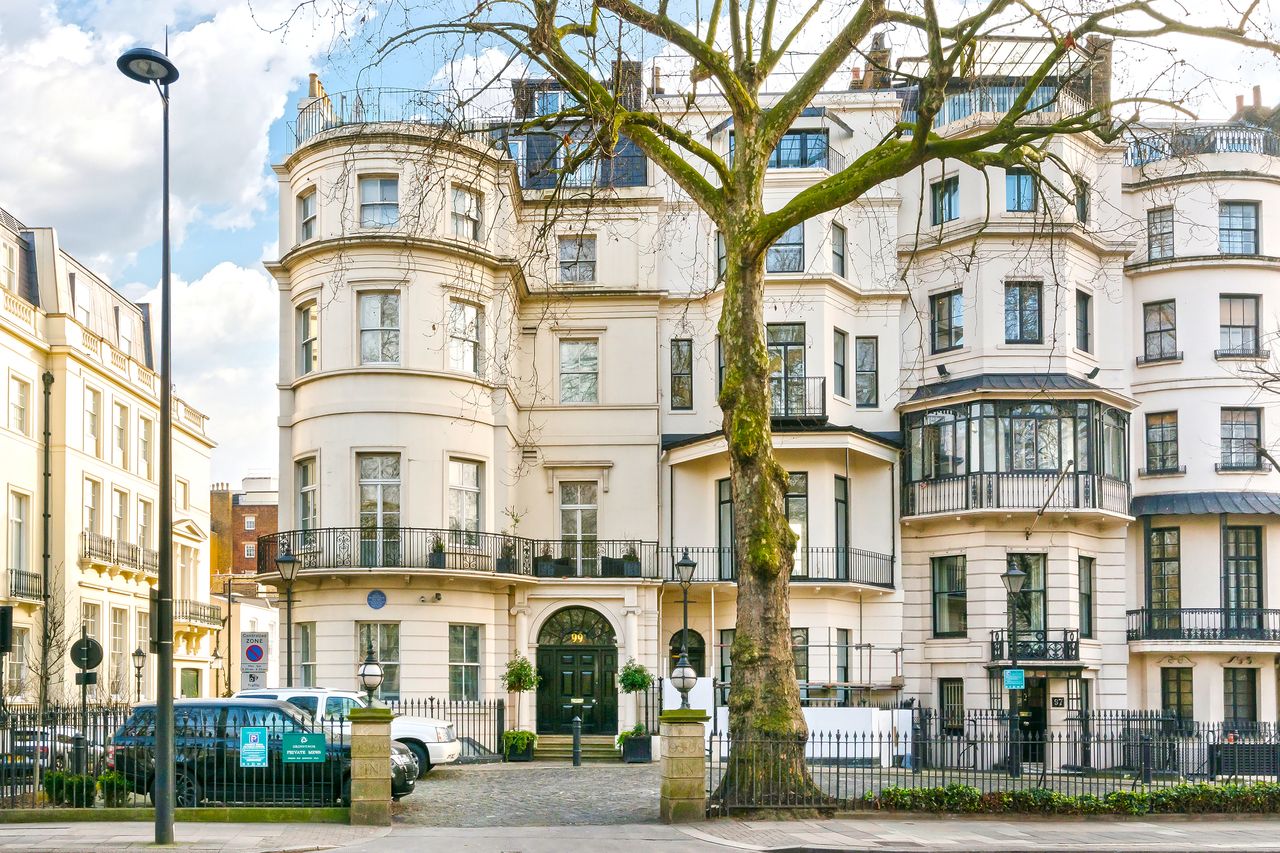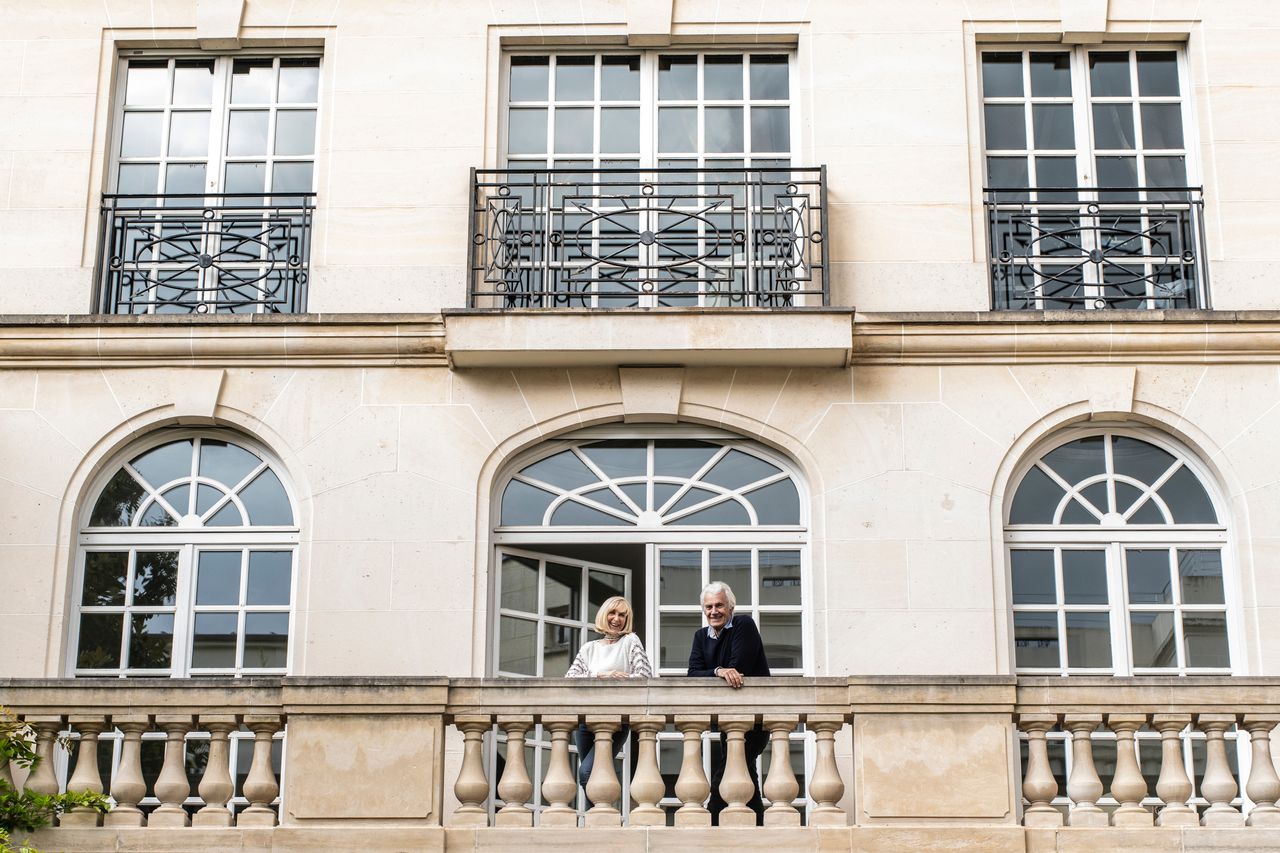With London luxury real-estate prices on the slide and a collapse in high-end deal volume, it has been a tough year for prime central London real estate. But the prime rental market is thriving. People in need of a London base are increasingly opting to take the flexible, minimal-commitment housing option rather than buying, and paying Britain’s high taxes, in a stalled market. As a result, prime rents are escalating.
House price analyst LonRes found that average prime rents in London increased 3.5% between December 2022 and December 2023. Average prime rents are now 29% above pre pandemic levels notched during the period of 2017 to 2019. Separate research from estate agent Beauchamp Estates found that 63 London homes were rented out for $6,370 or more per week—about $330,000 per year—between January and June 2023.
Buying agent Liam Monaghan, managing director of London Central Portfolio, said many of his prime tenants live a global, itinerant lifestyle. They include soccer players, actors and film producers and tech entrepreneurs.
“They can obviously afford to buy these properties, but perhaps they are on a short-term contract or are growing a business and have got a lot of wealth quite quickly and are jumping between lots of different countries and are still working out where they want to live,” said Monaghan.
Nina McDowall, head of lettings at estate agent Strutt & Parker’s office in Knightsbridge, one of London’s most expensive neighbourhoods, said many of her renters are considering buying a London property but only when they find the perfect home at a great price.
“There are a lot of people who are weighing up their options,” she said. “They might also be sitting tight to see if prices slide further.”
Others, such as Antonio Volpin, simply don’t see London property as a great investment opportunity. Volpin, who is Italian, moved to London for work in 2011, initially living out of hotels. When his wife and two sons joined him in London in 2012, the family started renting.

“We mulled the idea of buying a property, because the market was very strong, but I thought it could not grow forever, and with my work I am not sure where I will be next year,” said Volpin, 61, a consultant for asset and fund management firms.
The family’s decision to continue renting proved prescient, because prime central London’s house prices have stagnated for almost a decade. According to LonRes, average sale prices in prime central London increased by just 2.3% between 2013 and 2023 (from $2,130 per square foot to $2,180 per square foot). In 2016, Volpin’s job took him to Singapore, and now he and his university professor wife are based in Rome. Their two sons, aged 26 and 22, opted to remain in London so their parents, who visit regularly, have continued to rent a three-bedroom, three-level, apartment in the affluent, historic neighbourhood of South Kensington, 2 miles west of the city centre.

Volpin has signed a nondisclosure agreement prohibiting him from revealing his monthly rental costs, but a spokeswoman for his estate agent, Winkworth, said that a similar property would cost up to $191,000 per year.
“Certainly with that money I could buy, but the point is that at the moment it is more of a kind of holiday home,” Volpin said. “When I come, I want to be close to downtown and to the friends I made while living in London.”
McDowell believes that the reason top-end rental prices have accelerated while home sale prices are falling is simple: Demand for these types of rentals is high and there is a serious undersupply of high-specification, turnkey properties.
“They are as rare as hen’s teeth,” she said. “Super-prime tenants will not sacrifice or compromise on many things. The condition and functionality of the property has to be slick and beautiful, and they will pay big prices, or pay one or two years in advance, to secure the right property.”
But while rents are rising, prime-central London landlords still have to work hard to attract high-paying tenants who expect five-star standards.
“I have had people who want walls to be ripped out or massive extension work,” said Sinead Conlon, head of corporate and relocation services at John D Wood & Co. estate agents. “Some of them want interior-design furniture packages costing about $32,000 to $127,000 per month. They are all looking for an add-on.”
In one memorable case, Conlon was able to rent a substantial house in the north London suburb of Primrose Hill to a tenant who wanted the toilets in the bathrooms, 17 of them, to be replaced with Japanese models with built-in bidets. The tenant, who paid around $70,000 per month to rent the house for a year starting in 2021, eventually settled for just 10 new toilets to be fitted.
“But they are around £25,000 [$32,000] a pop, so it was not exactly cheap,” said Conlon.
Another problem facing landlords is dwindling profit margins. Interest rates have jumped and, since 2020, landlords cannot deduct mortgage interest from their tax bills, said Becky Fatemi, executive partner of Sotheby’s Realty UK. The administration of renting a property is also not cheap. Fatemi said landlords should expect to pay their estate agent between 8% and 15% of the annual rent to find and install a tenant. Management fees, if required, add another 5% to the cost.
Vickram Mirchandani currently owns and rents out two prime London properties. He is painfully aware how hard it is to turn a decent profit even in a hot rental market. Mirchandani, 46, who is British, bought a five-bedroom family home in the upscale neighbourhood of Belgravia, about 10 years ago. They lived in the home full time, but he and his wife became increasingly disillusioned with life in Britain and left London in October, then moved to Dubai with their young family in January—they have one child and are expecting a second.

CREDIT:Vickram Mirchandani
Mirchandani has decided against trying to sell the property until London’s property market has revived. In October 2023, tenants moved into the 4,200-square-foot townhouse, paying just under $8,900 per month in rent.
“It was gone within a week, on the second viewing, for the asking price,” said Mirchandani, a renewable-energy developer. “In hindsight, I could probably have got a little bit more.”
Mirchandani also owns a second property, a three-bedroom penthouse in Belgravia, which he had originally hoped to flip. “The plan was to purchase it, develop it, and sell it at a handsome margin,” he said. “But after Brexit that handsome margin never materialised.”
The apartment is also rented out, fetching $11,500 per month. “I actually got over asking price for that one because the tenant has a dog and I said, ‘Fine, but that will be an extra 10%,’ ” said Mirchandani. “I am very happy with the prices achieved.”
He is less happy with the yields his capital is earning. He estimates that after costs, including income tax, he is earning around 1.5% to 2%. England’s major banks are currently offering interest rates of around 4% to 5%. Longer term, Mirchandani is still weighing his options. “I could keep them in the hope that someday some miracle will happen and they will go up, but if we like it in Dubai we will probably sell the properties,” he said.
 Copyright 2020, Dow Jones & Company, Inc. All Rights Reserved Worldwide. LEARN MORE
Copyright 2020, Dow Jones & Company, Inc. All Rights Reserved Worldwide. LEARN MORE
What a quarter-million dollars gets you in the western capital.
Alexandre de Betak and his wife are focusing on their most personal project yet.
Ahead of the Games, a breakdown of the city’s most desirable places to live
PARIS —Paris has long been a byword for luxurious living. The traditional components of the upscale home, from parquet floors to elaborate mouldings, have their origins here. Yet settling down in just the right address in this low-rise, high-density city may be the greatest luxury of all.
Tradition reigns supreme in Paris real estate, where certain conditions seem set in stone—the western half of the city, on either side of the Seine, has long been more expensive than the east. But in the fashion world’s capital, parts of the housing market are also subject to shifting fads. In the trendy, hilly northeast, a roving cool factor can send prices in this year’s hip neighbourhood rising, while last year’s might seem like a sudden bargain.
This week, with the opening of the Olympic Games and the eyes of the world turned toward Paris, The Wall Street Journal looks at the most expensive and desirable areas in the City of Light.
The Most Expensive Arrondissement: the 6th
Known for historic architecture, elegant apartment houses and bohemian street cred, the 6th Arrondissement is Paris’s answer to Manhattan’s West Village. Like its New York counterpart, the 6th’s starving-artist days are long behind it. But the charm that first wooed notable residents like Gertrude Stein and Jean-Paul Sartre is still largely intact, attracting high-minded tourists and deep-pocketed homeowners who can afford its once-edgy, now serene atmosphere.
Le Breton George V Notaires, a Paris notary with an international clientele, says the 6th consistently holds the title of most expensive arrondissement among Paris’s 20 administrative districts, and 2023 was no exception. Last year, average home prices reached $1,428 a square foot—almost 30% higher than the Paris average of $1,100 a square foot.
According to Meilleurs Agents, the Paris real estate appraisal company, the 6th is also home to three of the city’s five most expensive streets. Rue de Furstemberg, a secluded loop between Boulevard Saint-Germain and the Seine, comes in on top, with average prices of $2,454 a square foot as of March 2024.
For more than two decades, Kyle Branum, a 51-year-old attorney, and Kimberly Branum, a 60-year-old retired CEO, have been regular visitors to Paris, opting for apartment rentals and ultimately an ownership interest in an apartment in the city’s 7th Arrondissement, a sedate Left Bank district known for its discreet atmosphere and plutocratic residents.
“The 7th was the only place we stayed,” says Kimberly, “but we spent most of our time in the 6th.”
In 2022, inspired by the strength of the dollar, the Branums decided to fulfil a longstanding dream of buying in Paris. Working with Paris Property Group, they opted for a 1,465-square-foot, three-bedroom in a building dating to the 17th century on a side street in the 6th Arrondissement. They paid $2.7 million for the unit and then spent just over $1 million on the renovation, working with Franco-American visual artist Monte Laster, who also does interiors.
The couple, who live in Santa Barbara, Calif., plan to spend about three months a year in Paris, hosting children and grandchildren, and cooking after forays to local food markets. Their new kitchen, which includes a French stove from luxury appliance brand Lacanche, is Kimberly’s favourite room, she says.
Another American, investor Ashley Maddox, 49, is also considering relocating.
In 2012, the longtime Paris resident bought a dingy, overstuffed 1,765-square-foot apartment in the 6th and started from scratch. She paid $2.5 million and undertook a gut renovation and building improvements for about $800,000. A centrepiece of the home now is the one-time salon, which was turned into an open-plan kitchen and dining area where Maddox and her three children tend to hang out, American-style. Just outside her door are some of the city’s best-known bakeries and cheesemongers, and she is a short walk from the Jardin du Luxembourg, the Left Bank’s premier green space.
“A lot of the majesty of the city is accessible from here,” she says. “It’s so central, it’s bananas.” Now that two of her children are going away to school, she has listed the four-bedroom apartment with Varenne for $5 million.
The Most Expensive Neighbourhoods: Notre-Dame and Invalides
Garrow Kedigian is moving up in the world of Parisian real estate by heading south of the Seine.
During the pandemic, the Canada-born, New York-based interior designer reassessed his life, he says, and decided “I’m not going to wait any longer to have a pied-à-terre in Paris.”
He originally selected a 1,130-square-foot one-bedroom in the trendy 9th Arrondissement, an up-and-coming Right Bank district just below Montmartre. But he soon realised it was too small for his extended stays, not to mention hosting guests from out of town.
After paying about $1.6 million in 2022 and then investing about $55,000 in new decor, he put the unit up for sale in early 2024 and went house-shopping a second time. He ended up in the Invalides quarter of the 7th Arrondissement in the shadow of one Paris’s signature monuments, the golden-domed Hôtel des Invalides, which dates to the 17th century and is fronted by a grand esplanade.
His new neighbourhood vies for Paris’s most expensive with the Notre-Dame quarter in the 4th Arrondissement, centred on a few islands in the Seine behind its namesake cathedral. According to Le Breton, home prices in the Notre-Dame neighbourhood were $1,818 a square foot in 2023, followed by $1,568 a square foot in Invalides.
After breaking even on his Right Bank one-bedroom, Kedigian paid $2.4 million for his new 1,450-square-foot two-bedroom in a late 19th-century building. It has southern exposures, rounded living-room windows and “gorgeous floors,” he says. Kedigian, who bought the new flat through Junot Fine Properties/Knight Frank, plans to spend up to $435,000 on a renovation that will involve restoring the original 12-foot ceiling height in many of the rooms, as well as rescuing the ceilings’ elaborate stucco detailing. He expects to finish in 2025.
Over in the Notre-Dame neighbourhood, Belles demeures de France/Christie’s recently sold a 2,370-square-foot, four-bedroom home for close to the asking price of about $8.6 million, or about $3,630 a square foot. Listing agent Marie-Hélène Lundgreen says this places the unit near the very top of Paris luxury real estate, where prime homes typically sell between $2,530 and $4,040 a square foot.
The Most Expensive Suburb: Neuilly-sur-Seine
The Boulevard Périphérique, the 22-mile ring road that surrounds Paris and its 20 arrondissements, was once a line in the sand for Parisians, who regarded the French capital’s numerous suburbs as something to drive through on their way to and from vacation. The past few decades have seen waves of gentrification beyond the city’s borders, upgrading humble or industrial districts to the north and east into prime residential areas. And it has turned Neuilly-sur-Seine, just northwest of the city, into a luxury compound of first resort.
In 2023, Neuilly’s average home price of $1,092 a square foot made the leafy, stately community Paris’s most expensive suburb.
Longtime residents, Alain and Michèle Bigio, decided this year is the right time to list their 7,730-square-foot, four-bedroom townhouse on a gated Neuilly street.
The couple, now in their mid 70s, completed the home in 1990, two years after they purchased a small parcel of garden from the owners next door for an undisclosed amount. Having relocated from a white-marble château outside Paris, the couple echoed their previous home by using white- and cream-coloured stone in the new four-story build. The Bigios, who will relocate just back over the border in the 16th Arrondissement, have listed the property with Emile Garcin Propriétés for $14.7 million.
The couple raised two adult children here and undertook upgrades in their empty-nester years—most recently, an indoor pool in the basement and a new elevator.
The cool, pale interiors give way to dark and sardonic images in the former staff’s quarters in the basement where Alain works on his hobby—surreal and satirical paintings, whose risqué content means that his wife prefers they stay downstairs. “I’m not a painter,” he says. “But I paint.”
The Trendiest Arrondissement: the 9th
French interior designer Julie Hamon is theatre royalty. Her grandfather was playwright Jean Anouilh, a giant of 20th-century French literature, and her sister is actress Gwendoline Hamon. The 52-year-old, who divides her time between Paris and the U.K., still remembers when the city’s 9th Arrondissement, where she and her husband bought their 1,885-square-foot duplex in 2017, was a place to have fun rather than put down roots. Now, the 9th is the place to do both.
The 9th, a largely 19th-century district, is Paris at its most urban. But what it lacks in parks and other green spaces, it makes up with nightlife and a bustling street life. Among Paris’s gentrifying districts, which have been transformed since 2000 from near-slums to the brink of luxury, the 9th has emerged as the clear winner. According to Le Breton, average 2023 home prices here were $1,062 a square foot, while its nearest competitors for the cool crown, the 10th and the 11th, have yet to break $1,011 a square foot.
A co-principal in the Bobo Design Studio, Hamon—whose gut renovation includes a dramatic skylight, a home cinema and air conditioning—still seems surprised at how far her arrondissement has come. “The 9th used to be well known for all the theatres, nightclubs and strip clubs,” she says. “But it was never a place where you wanted to live—now it’s the place to be.”
With their youngest child about to go to college, she and her husband, 52-year-old entrepreneur Guillaume Clignet, decided to list their Paris home for $3.45 million and live in London full-time. Propriétés Parisiennes/Sotheby’s is handling the listing, which has just gone into contract after about six months on the market.
The 9th’s music venues were a draw for 44-year-old American musician and piano dealer, Ronen Segev, who divides his time between Miami and a 1,725-square-foot, two-bedroom in the lower reaches of the arrondissement. Aided by Paris Property Group, Segev purchased the apartment at auction during the pandemic, sight unseen, for $1.69 million. He spent $270,000 on a renovation, knocking down a wall to make a larger salon suitable for home concerts.
During the Olympics, Segev is renting out the space for about $22,850 a week to attendees of the Games. Otherwise, he prefers longer-term sublets to visiting musicians for $32,700 a month.
Most Exclusive Address: Avenue Junot
Hidden in the hilly expanses of the 18th Arrondissement lies a legendary street that, for those in the know, is the city’s most exclusive address. Avenue Junot, a bucolic tree-lined lane, is a fairy-tale version of the city, separate from the gritty bustle that surrounds it.
Homes here rarely come up for sale, and, when they do, they tend to be off-market, or sold before they can be listed. Martine Kuperfis—whose Paris-based Junot Group real-estate company is named for the street—says the most expensive units here are penthouses with views over the whole of the city.
In 2021, her agency sold a 3,230-square-foot triplex apartment, with a 1,400-square-foot terrace, for $8.5 million. At about $2,630 a square foot, that is three times the current average price in the whole of the 18th.
Among its current Junot listings is a 1930s 1,220-square-foot townhouse on the avenue’s cobblestone extension, with an asking price of $2.8 million.















